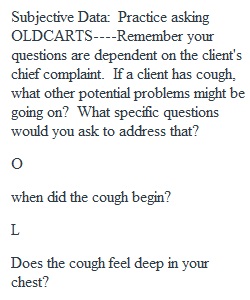


Q Case Assignments • Groups 1-4: Case #1 • Groups 5-9: Case #2 ADDITIONAL QUESTIONS (at bottom of this page) • Groups 1, 2 and 3: 1-4 • Groups 4, 5 and 6: 5-8 • Groups 7, 8 and 9: 8-11 Respiratory Focused Case Study #1 Chief Complaint (CC): 65 year old female client complains of shortness of breath. How would you focus your Respiratory assessment? • Subjective Data: Practice asking OLDCARTS----Remember your questions are dependent on the client's chief complaint. If a client has shortness of breath, what other potential problems might be going on? What specific questions would you ask to address that? o ? O ? L ? D ? C----get details-----what questions give you details about the character? ? A/A ----What makes it worse? What other symptoms might go along with shortness of breath? ? R ? T ? S--- Are they able to perform daily functions? Why is it important to ask this? • Objective Data: o ? Inspect: For what are you inspecting for this client? Why? (See pictures below to help you) ? Chest Contour ? Signs of respiratory distress (What are they?) ? What is her respiratory rate? ? Auscultate: Listen to the following sounds in the "Lungs Audio" section of the modules. Discuss what you hear and why these might correlate with shortness of breath ? You hear fine crackles in posterior lower lobes (listen to the audio) ? You hear wheeze (sibilant) in anterior middle right lobe Respiratory Focused Case Study #2 Chief Complaint (CC): 31 year old female client complains of cough. How would you focus your Respiratory assessment? • Subjective Data: Practice asking OLDCARTS----Remember your questions are dependent on the client's chief complaint. If a client has cough, what other potential problems might be going on? What specific questions would you ask to address that? o ? O ? L ? D ? C----get details-----what questions give you details about the character? Is she producing any sputum? What characteristics of the sputum will you ask her about? ? A/A ----What makes it worse? What other symptoms might go along with cough? ? R ? T ? S • Objective Data: o ? Inspect: For what are you inspecting for this client? Why? (See pictures below to help you) ? Chest Contour ? Signs of respiratory distress (What are they?) ? What is her respiratory rate? ? Auscultate: Listen to the following sounds in the "Lungs Audio" section of the modules. Discuss what you hear and why these might correlate with cough ? You hear course crackles in posterior lower lobes (listen to the audio) which the client is able to clear with coughing ? You hear mostly vesicular sounds in anterior lung fields ADDITIONAL QUESTIONS----You will work on these during class 1. Identify Breath Sounds #1: Bilateral Upper lobes both anterior (not sternal border) and poster (not spinal border) 2. Identify Breath Sounds #2: Bilateral Lower Lobes both anterior and posterior 3. What signs would you notice if someone had labored breathing or was in respiratory distress? Does barrel chest indicate acute or chronic disease? Is respiratory distress acute or chronic? 4. How would you interpret this finding? 5. What do you notice here? How would you interpret this? 6. What do you notice here? How would you interpret this? 7. What do you notice here? How would you interpret this? 8. What do you notice here? How would you interpret this? 9. What do you notice here? How would you interpret this? 10. What is the purpose of inspecting the axillae when performing a breast exam? 11. What do you notice here? How would you interpret these findings? What would you do FIRST if you noticed this? PreviousNext
View Related Questions